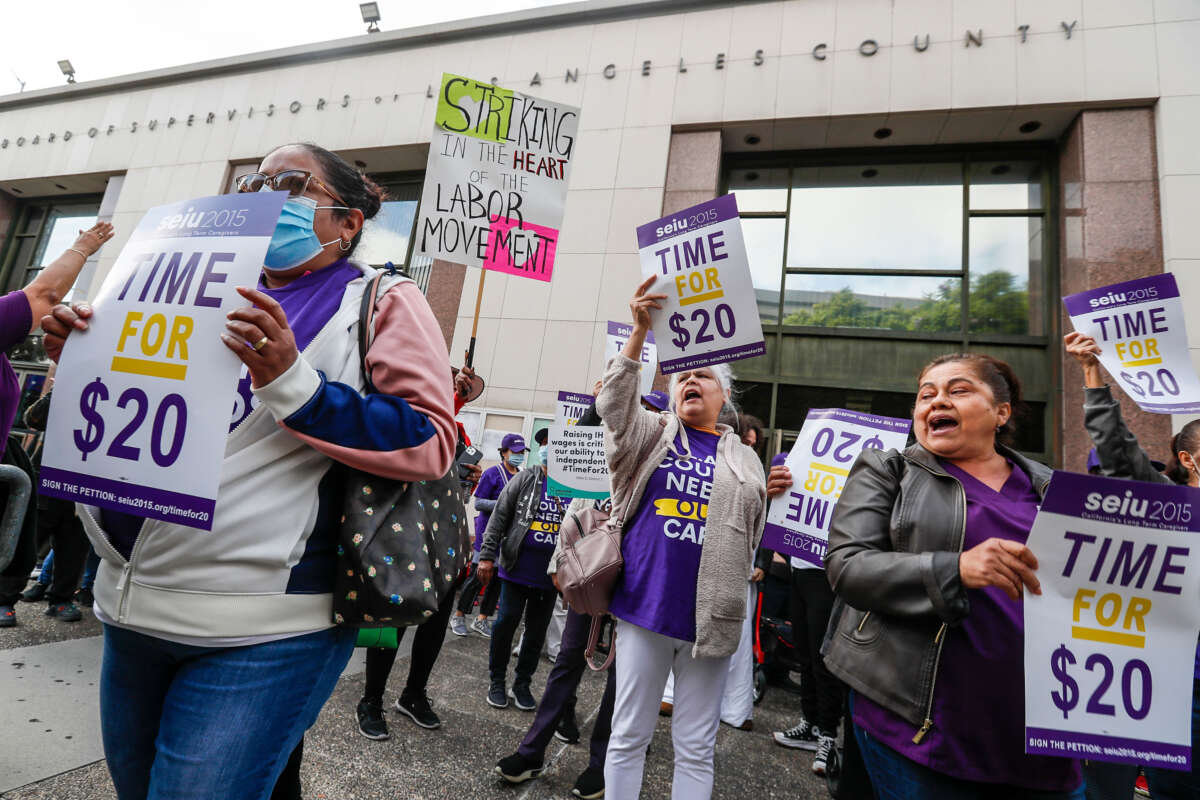The federal minimum wage hasn’t been raised in 14 years, a record-long stretch.
By Sharon Zhang ,
PublishedMay 30, 2023

Workers who assist people with disabilities in their homes through the In-Home Supportive Services program urge the Los Angeles County Board of Supervisors to increase their pay on November 1, 2022, in Los Angeles, California.
ROBERT GAUTHIER / LOS ANGELES TIMES VIA GETTY IMAGES
Amid the longest period in Congressional history without any raising of the federal minimum wage, new polling finds that the vast majority of voters not only support raising the minimum wage, but also nearly tripling it.
According to polling by Data for Progress released last week, 74 percent of voters support raising the federal minimum wage to $20 an hour — almost three times the current level of $7.25 an hour. A majority of 50 percent of respondents said they “strongly support” the proposal, while 24 percent said they “somewhat” support it.
This support includes majorities of voters across the political spectrum. Support is strongest among Democrats, with 89 percent saying that they favor raising the minimum wage to $20 an hour. But independents and Republicans back the idea as well, with 74 percent and 60 percent support from both groups, respectively.
Amid the longest period in Congressional history without any raising of the federal minimum wage, new polling finds that the vast majority of voters not only support raising the minimum wage, but also nearly tripling it.
According to polling by Data for Progress released last week, 74 percent of voters support raising the federal minimum wage to $20 an hour — almost three times the current level of $7.25 an hour. A majority of 50 percent of respondents said they “strongly support” the proposal, while 24 percent said they “somewhat” support it.
This support includes majorities of voters across the political spectrum. Support is strongest among Democrats, with 89 percent saying that they favor raising the minimum wage to $20 an hour. But independents and Republicans back the idea as well, with 74 percent and 60 percent support from both groups, respectively.
The polling comes amid a 14-year stretch since the last time the federal minimum wage was raised, with its real value reaching its lowest point in 67 years. The minimum wage is not a living wage – the wage required to afford basic needs like shelter – nearly anywhere in the U.S.
According to the Massachusetts Institute of Technology living wage calculator, in a typical family of four with two adults and two children, both adults would need to work 98 hours a week in order to survive on a $7.25 wage. In fact, research in 2021 found that even a $15 minimum wage — more than double the current minimum wage — isn’t a living wage in any state in the U.S. MIT’s living wage calculator estimated that, in 2021, the living wage for a family of four was $24.16 an hour, or about $100,500 a year.
RELATED STORY

ECONOMY & LABOR
In Louisiana, Rock-Bottom Minimum Wage Is Becoming a Liability for Republicans
Republicans stubbornly defend $7.25 an hour in a state where more than one in four children live in poverty.
By Mike Ludwig ,
May 17, 2023
A $20 an hour wage is a nonstarter in Congress. Thirty states and many municipalities have raised their minimum wage above $7.25, with four states with a minimum wage of $15 an hour.
Progressive and Democratic lawmakers have tried to raise the federal minimum wage to $15 an hour, but have been thwarted by the GOP and conservatives in their own party.
Sen. Bernie Sanders (I-Vermont) is embarking on a tour of several Southern states this week in order to promote his bill that would raise the federal minimum wage to $17 an hour, which he says should be the new benchmark after over a decade of labor activists’ Fight for $15 campaign.
The Data for Progress polling found significant support for Sanders’s proposal as well. A slightly higher proportion of voters support raising the federal minimum to $17 an hour, with 76 percent support overall and 94 percent support from Democrats.
The survey further found that voters overwhelmingly recognize that workers must be paid more than $20 an hour in order to have a “decent quality of life” — as in, being able to afford basic necessities like food and rent without struggling. Sixty-three percent of respondents said that workers must earn more than $20 an hour to have a decent quality of life. When asked to estimate a benchmark at which that quality of life could be achieved, voters responded with an average answer of $26.20.
Even if the federal minimum wage were raised, a large swath of workers like tipped workers, whose federal minimum wage is $2.13, and gig workers, would be exempt from it. In some places, voters and lawmakers have passed legislation to end the tipped wage or set a minimum wage for gig workers like Uber drivers, but the initiatives have little chance of being considered by Congress.
Truthout is widely read among people with lower incomes and among young people who are mired in debt. Our site is read at public libraries, among people without internet access of their own. People print out our articles and send them to family members in prison — we receive letters from behind bars regularly thanking us for our coverage. Our stories are emailed and shared around communities, sparking grassroots mobilization.
We’re committed to keeping all Truthout articles free and available to the public. But in order to do that, we need those who can afford to contribute to our work to do so.
We’ll never require you to give, but we can ask you from the bottom of our hearts: Will you donate what you can, so we can continue providing journalism in the service of justice and truth?
This article is licensed under Creative Commons (CC BY-NC-ND 4.0), and you are free to share and republish under the terms of the license.
A $20 an hour wage is a nonstarter in Congress. Thirty states and many municipalities have raised their minimum wage above $7.25, with four states with a minimum wage of $15 an hour.
Progressive and Democratic lawmakers have tried to raise the federal minimum wage to $15 an hour, but have been thwarted by the GOP and conservatives in their own party.
Sen. Bernie Sanders (I-Vermont) is embarking on a tour of several Southern states this week in order to promote his bill that would raise the federal minimum wage to $17 an hour, which he says should be the new benchmark after over a decade of labor activists’ Fight for $15 campaign.
The Data for Progress polling found significant support for Sanders’s proposal as well. A slightly higher proportion of voters support raising the federal minimum to $17 an hour, with 76 percent support overall and 94 percent support from Democrats.
The survey further found that voters overwhelmingly recognize that workers must be paid more than $20 an hour in order to have a “decent quality of life” — as in, being able to afford basic necessities like food and rent without struggling. Sixty-three percent of respondents said that workers must earn more than $20 an hour to have a decent quality of life. When asked to estimate a benchmark at which that quality of life could be achieved, voters responded with an average answer of $26.20.
Even if the federal minimum wage were raised, a large swath of workers like tipped workers, whose federal minimum wage is $2.13, and gig workers, would be exempt from it. In some places, voters and lawmakers have passed legislation to end the tipped wage or set a minimum wage for gig workers like Uber drivers, but the initiatives have little chance of being considered by Congress.
Truthout is widely read among people with lower incomes and among young people who are mired in debt. Our site is read at public libraries, among people without internet access of their own. People print out our articles and send them to family members in prison — we receive letters from behind bars regularly thanking us for our coverage. Our stories are emailed and shared around communities, sparking grassroots mobilization.
We’re committed to keeping all Truthout articles free and available to the public. But in order to do that, we need those who can afford to contribute to our work to do so.
We’ll never require you to give, but we can ask you from the bottom of our hearts: Will you donate what you can, so we can continue providing journalism in the service of justice and truth?
This article is licensed under Creative Commons (CC BY-NC-ND 4.0), and you are free to share and republish under the terms of the license.

SHARON ZHANG is a news writer at Truthout covering politics, climate and labor. Before coming to Truthout, Sharon had written stories for Pacific Standard, The New Republic, and more. She has a master’s degree in environmental studies. She can be found on Twitter: @zhang_sharon.
No comments:
Post a Comment